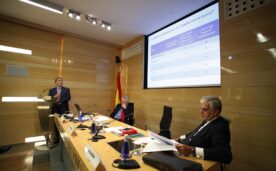The Rafael del Pino Foundation received Manuel Conthe, who delivered, as part of the "Behaviour, mathematics and politics" series, the Keynote Lecture entitled "Simple decisions on complex problems: 'The logic of failing to keep some electoral promises'".
Manuel Conthe said: "Ostrogorski's Paradox' states that there are occasions when a political party can win an election despite supporting ideas that do not have majority support. That is why in some of my journalistic articles I have argued that it can sometimes make sense for a ruler, once in power, not to fulfil his programme, since the majority opinion is against his doing so. When it comes to politics, we vote for packages that bring together very complex issues. Some we like, others we do not. This makes us uncomfortable and sometimes leads to paradoxes such as the fact that, on occasions, political parties and their representatives, in order to gain support for their proposals, include ideas or issues in them that, if voted on individually, would not receive the necessary support. By being included in a group of proposals, they do get support.
These concepts are not confined to the field of politics: "In the Unified Code of Good Governance [which Manuel Conthe directed] we included a recommendation: General Shareholders' Meetings should vote on issues and proposals on an individual basis. For example, in the case of nominations to the Board of Directors, individual votes should be taken for each of the candidates. This would prevent 'bad' candidates from being included 'de matute' on a common list and gaining access to the board through the support of the 'good' ones.







